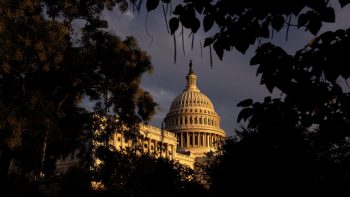KAI RYSSDAL: The White House gave at least a nod to negotiating with Congress today over the Iraq war funding bill. The president said benchmarks for progress in Iraq might not be such a bad thing after all.
The House has come up with a $43 billion package it wants to send the president. But he’s already said he’ll veto it because the funding runs out in July.
In his new book about the history of how America pays for its wars, Goldman Sachs Vice Chairman Robert Hormats points out that nobody’s paying attention to where that money’s coming from. It’s borrowed. And both Congress and the White House are side-stepping their obligations to pay back their debts.
Bob Hormats, welcome to the program.
BOB HORMATS: Thank you for having me.
RYSSDAL: Let me cast the long look backwards at history and ask you about the drive that our national leaders have had in almost every war up until the present case to eliminate the debt caused by funding that war in the military — with some degree of expediency, right?
HORMATS: Absolutely. It was a fundamental tenant of U.S. policy — from the Revolution through about the early 1960s — that when you accumulated debt to pay for war, which was the case in every war in our history, you also worked very hard after the war to pay down that debt. George Washington, in his famous farewell address, said that Americans should not ungenerously, as he put it, throw debt upon the next generation that they themselves ought to be paying off. Jefferson believed this. After the Civil War, a major effort was made to pay down the enormous Civil War debt. Same was done after World War I. And even after World War II, a lot of the debt was paid down relatively quickly.
RYSSDAL: Well then, what happened in the 1960s?
HORMATS: In the 1960s, we became used to big deficits — they didn’t seem to matter to Americans. And in the Vietnam War, in particular, there was not the sense that we had an obligation to finance the war in a fiscally responsible way. And I think up until very recently, there has been the view that somehow, war debts . . . first of all would be relatively small, because it was anticipated the Iraq war would be short and cheap — although it turned out not to be. But also that somehow growth would bail us out, that we wouldn’t have to make any sacrifice. We wouldn’t have to cut back on other domestic programs to make room in the budget for the military. And that has worked temporarily, but it’s not a permanent solution. You can’t always rely on that.
RYSSDAL: Give me the subjective answer here: Has U.S. national security been improved or harmed by the way we’re financing the war in Iraq and the war on terror?
HORMATS: I think national security today is more vulnerable, because of the way we have financed the war in Iraq and the war on terror. In the following sense: First of all, it’s important to level with the American people about the costs of national security. In so doing, you bring the American people along. You give them a better sense of what’s required. You help to mobilize support for national security spending. Second, going forward with appropriations through the supplemental process in a way skirts the budget process. So it means you don’t have to set priorities, it means you just put this additional money in without making reallocations within the budget among various programs. Third is that we’re going to be going into a decade in which almost certainly, the budget deficit is going to mushroom. It means that there will be less flexibility in the budget to finance national emergencies. And those big-budget deficits will balloon even further if there’s a terrorist attack, because revenues will decline and we will then have a very serious fiscal problem. Then that can push up interest rates further and further weaken the economy.
RYSSDAL: The book by Bob Hormats on how America finances its national security is called “The Price of Liberty.” Bob Hormats is a vice chairman at Goldman Sachs International. Mr. Hormats, thanks a lot for your time.
HORMATS: Thank you for having me.
There’s a lot happening in the world. Through it all, Marketplace is here for you.
You rely on Marketplace to break down the world’s events and tell you how it affects you in a fact-based, approachable way. We rely on your financial support to keep making that possible.
Your donation today powers the independent journalism that you rely on. For just $5/month, you can help sustain Marketplace so we can keep reporting on the things that matter to you.


















